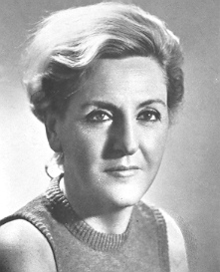Carla Capponi
| Carla Capponi | |
|---|---|
 Carla Capponi in 1970 | |
| Born |
7 December 1918 Rome, Italy |
| Died |
24 November 2000 (aged 81) Zagarolo, Italy |
| Occupation | Italian politician and partisan |
| Spouse(s) | Rosario Bentivegna (m. 1944; div. 1974) |
Carla Capponi aka The Little English Girl (7 December 1918 in Rome; 24 November 2000 in Zagarolo) was an Italian partisan and politician who received the Gold Medal of Military Valour for her participation in the Italian resistance movement.
Biography
Carla Capponi grew up in Rome, where she was the eldest child. She attended the Ennio Quirino Visconti Liceo Ginnasio. In 1940 her father who was a mining engineer died and the three sisters had to work.[1]
Italian resistance
Around the time of the German occupation of Italy, she joined the Italian Communist Party and began her involvement in the resistance. A comrade in the struggle described her as "this young blonde woman who went out at night to shoot Germans... [W]ith arms in hand, first among the first, she participated in dozens of actions, distinguishing herself in a superb way." During the war she was known as "The little English Girl" (Inglesina).[1]
Among her first major actions was the assassination of a German officer leaving the Hotel Excelsior carrying a briefcase with defence plans for the city. Capponi described the action:
"It was a traumatic experience. I almost wanted to call to him, to make him turn around... but I knew he was armed. It seemed impossible that with my peaceful disposition, against any form of violence, I should hold the gun, point it at him and shoot him in the back. I took his briefcase. I was in shock... I began running down the street with the gun still in my hand... It was raining and tears were streaming down my face... After getting over the initial shock, especially since many of our comrades were being arrested and tortured, all our scruples were replaced by sheer determination to fight for our cause."
She quickly rose to become a vice-commander of a Gruppi di azione patriottica squad.[2]
Post-war
On 22 September 1944, Capponi married Rosario Bentivegna, with whom she fought in the resistance. In 1945, she gave birth to a daughter named Elena. The couple later divorced in 1974.
In 1953, she was elected to the Chamber of Deputies as a member of the Italian Communist Party. She served two terms, from 1953 to 1958 and later from 1972 to 1976.[1] She also served on the executive committee of the National Association of Italian Partisans until her death in 2000.
Capponi was awarded the Gold Medal of Military Valour. She was one of only twelve Italian women who were given this honour.[1]
References
- 1 2 3 4 Susanna Scarparo; Rita Wilson (2004). Across Genres, Generations and Borders: Italian Women Writing Lives. University of Delaware Press. pp. 70–. ISBN 978-0-87413-918-1.
- ↑ Slaughter, Jane (1997). Women and the Italian resistance, 1943-1945. Denver, Colo: Arden Press. pp. 57–60. ISBN 0912869143.